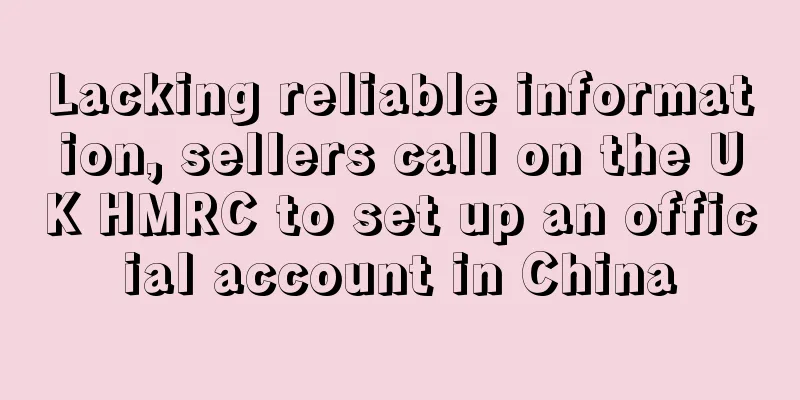Lacking reliable information, sellers call on the UK HMRC to set up an official account in China

|
Recently, in order to understand Chinese sellers’ knowledge and attitude towards UK tax regulations, the UK Revenue and Customs HMRC commissioned research organization IFF Research to conduct a survey on 30 online retailers in China.
The survey found that:
1. Sellers lack reliable and easy-to-understand policy information sources
Some sellers are more aware of the tax and customs clearance regulations implemented in the UK since January 1 this year, but many sellers are not very aware of it. Most sellers find it difficult to find and understand information about changes in UK policies. This is mainly because reliable information in Chinese is not available. Sellers often translate information received from other sources, and some prefer to keep in touch with HMRC via email. However, sometimes due to mailbox function settings or capacity issues, there may be a risk of email loss. For this reason, some sellers suggest that HMRC should consider other communication channels, such as the seller's online market platform portal or setting up an official account on Chinese social platforms such as WeChat.
2. Most sellers prefer to use external agents
Most of the sellers interviewed said they would use tax and freight forwarders to ensure compliance, but they rarely conduct rigorous research on the agents and only make choices based on recommendations and experience. In addition, Chinese sellers mainly rely on one or two online market platforms ( OMPs), and in terms of delivery business, they entrust freight forwarders to transport goods to OMP warehouses in the UK or Europe, and then the OMP fulfillment center is responsible for delivering the products to British users.
Martin Palmer, chief content and compliance officer of Hurricane Commerce , a cross-border e-commerce technology company, commented on the survey results, saying that although Chinese sellers recognize the importance of compliance operations, some habitual practices pose significant risks. They need to establish a sound system to ensure that OMPs and other suppliers can be continuously audited.
Sellers really need to pay attention to the recognition and implementation of tax policies. This involves everyone's interests, and many losses are caused by improper tax handling. Some time ago, a seller had to pay tens of thousands of pounds in high VAT due to a mistake in customs clearance in the UK.
If you want to avoid this kind of thing from happening, it is of utmost importance to keep abreast of the latest policy changes. The current channels for obtaining information include online market platforms (such as announcements from Amazon, eBay and other platforms), industry media and related forum communities. If HMRC adopts the opinions of the investigated sellers and opens an official account on Chinese social platforms, it may help sellers avoid detours. U.K. Taxation customs |
>>: eBay releases second quarter 2021 financial report, performance exceeds expectations
Recommend
Amazon's European and American sites have seen a sharp drop in inventory capacity, with sellers saying it's "difficult to survive"
Amazon's European and American sites have see...
Shenzhen Huaqiangbei was closed for four days, and sellers moved goods overnight!
Shenzhen Municipal Health Commission reported tha...
What is Huawei Cloud? Huawei Cloud Review, Features
HUAWEI CLOUD is Huawei's cloud service brand. ...
Online consumption in Malaysia soars, LazMall sales surge
According to foreign media reports, according to ...
What is sourcify? sourcify Review, Features
Sourcify is the fastest growing sourcing platform...
Sales reached $90 billion! Personal care products will continue to be popular
Did you catch the traffic boom on Valentine's...
What is Dedao International Logistics? Dedao International Logistics Review, Features
Dedao International Logistics (Shenzhen) Co., Ltd...
What is sandriver? sandriver Review, Features
Sandriver is a Chinese high-end fashion cashmere b...
What is Sponsored Brands? Sponsored Brands Review, Features
Sponsored Brands is one of the advertising types i...
When marketing to Generation Z, sellers need to pay attention to...
Generation Z generally refers to the generation b...
The 2021 product selection trends are out, and these 10 categories have the potential to explode!
E-commerce consumption surged in 2020, and this t...
Despite Omicron, the US footwear and accessories market will continue to rebound in 2022
Recently, Beth Goldstein, an analyst at research ...
What is Entriwise? Entriwise Review, Features
<span data-docs-delta="[[20,{"gallery"...
Baidu continues to reduce its holdings, and the "category leader" earns less than 4 million in half a year
Recently, the listed sellers have issued their fi...
What is Jiqi.com? Jiqi.com Review, Features
Jiqi.com (Changsha Maopao Network Technology Co., ...









